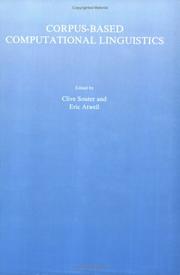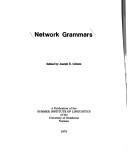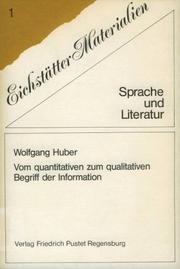| Listing 1 - 6 of 6 |
Sort by
|

ISBN: 9004653546 9051834853 Year: 1993 Publisher: Amsterdam : BRILL,
Abstract | Keywords | Export | Availability | Bookmark
 Loading...
Loading...Choose an application
- Reference Manager
- EndNote
- RefWorks (Direct export to RefWorks)
The new-media revolution has led to a comprehensive digitization of our textual universe and the pervasive incorporation of the media into our everyday lives (from mobile telephony to social media). This calls for a concerted research effort uniting linguistics and other disciplines involved in language-related research. The massive growth in the amount, diversity and availability of textual and multimodal language data for many of the world's languages poses several challenges. In terms of theory and methods, it forces us to rethink traditional notions of what linguistic corpora are and what role they play in linguistic description. Established corpus-linguistic methods such as concordancing and textual statistics are increasingly being complemented by visualization and geolocation of digital language data. Empirically, there is a growing need to document and analyse what people do with language in the increasingly technologized communicative ecology of the 21st century.
Book
ISBN: 9780857240934 0857240935 0857240943 1283223198 9786613223197 Year: 2011 Volume: 25 Publisher: Bingley, UK: Emerald,
Abstract | Keywords | Export | Availability | Bookmark
 Loading...
Loading...Choose an application
- Reference Manager
- EndNote
- RefWorks (Direct export to RefWorks)
Although the notion of procedural meaning is found in areas such as discourse markers, reference, tense, modality and intonation, until now there has been no single volume entirely devoted to it. Over 25 years, since the initial proposal by Blakemore, a number of refinements have been suggested, yet some criticisms have also been raised. The role and status of the conceptual / procedural distinction within a theory of human communication and the nature of procedural encoding were in need of reassessment in the light of current research in linguistic theory, cognitive science, experimental pragmatics and language acquisition. The papers collected here serve this general purpose from different standpoints. Some of them consider the topic from the angle of its theoretical foundations and put forth original proposals aimed at clarifying the most controversial issues. Others take a more data-driven orientation and offer novel analyses illustrating how encoded instructions work and how much can be gained from approaching certain linguistic phenomena in procedural terms. The contributions in this volume represent an inflection point in the delimitation and understanding of the notion of procedural meaning and open new paths for future research.
Lexicology. Semantics --- Pragmatics --- Semantics --- Network grammar --- Semantics - Congresses --- Network grammar - Congresses --- Meaning-text theory (Linguistics)

ISBN: 0883120550 Year: 1975 Publisher: Norman, Okla. University of Oklahoma, Summer Institute of Linguistics
Abstract | Keywords | Export | Availability | Bookmark
 Loading...
Loading...Choose an application
- Reference Manager
- EndNote
- RefWorks (Direct export to RefWorks)
Network grammar --- Tagmemics --- Grammemes --- Tagmemes --- Tagmemic analysis --- Augmented transition network grammar --- Procedural grammar --- Transition network grammar --- Grammar --- Grammar, Comparative and general --- Linguistic analysis (Linguistics) --- Computational linguistics

ISBN: 3791707817 Year: 1984 Publisher: Regensburg Pustet
Abstract | Keywords | Export | Availability | Bookmark
 Loading...
Loading...Choose an application
- Reference Manager
- EndNote
- RefWorks (Direct export to RefWorks)
Communication --- Computational linguistics --- Information theory --- Network grammar --- Mathematical models
Book
ISBN: 1283223198 9786613223197 0857240943 9780857240941 9780857240934 0857240935 Year: 2011 Publisher: Bingley, U.K. Emerald
Abstract | Keywords | Export | Availability | Bookmark
 Loading...
Loading...Choose an application
- Reference Manager
- EndNote
- RefWorks (Direct export to RefWorks)
Although the notion of procedural meaning is found in areas such as discourse markers, reference, tense, modality and intonation, until now there has been no single volume entirely devoted to it. Over 25 years, since the initial proposal by Blakemore, a number of refinements have been suggested, yet some criticisms have also been raised. The role and status of the conceptual / procedural distinction within a theory of human communication and the nature of procedural encoding were in need of reassessment in the light of current research in linguistic theory, cognitive science, experimental pragmatics and language acquisition. The papers collected here serve this general purpose from different standpoints. Some of them consider the topic from the angle of its theoretical foundations and put forth original proposals aimed at clarifying the most controversial issues. Others take a more data-driven orientation and offer novel analyses illustrating how encoded instructions work and how much can be gained from approaching certain linguistic phenomena in procedural terms. The contributions in this volume represent an inflection point in the delimitation and understanding of the notion of procedural meaning and open new paths for future research.

ISBN: 3540127895 0387127895 9783540127895 9780387127897 3642821243 3642821227 Year: 1983 Publisher: Berlin: Springer,
Abstract | Keywords | Export | Availability | Bookmark
 Loading...
Loading...Choose an application
- Reference Manager
- EndNote
- RefWorks (Direct export to RefWorks)
Computer science --- Interpreting --- Network grammar --- Interpreters (Computer programs) --- Text editors (Computer programs) --- Compilers (Computer programs) --- Editeurs de texte (Logiciels) --- Compilateurs (Logiciels) --- 681.3*I27 --- Editors, Text (Computer programs) --- Computer programs --- Programming software --- Systems software --- Word processing --- Augmented transition network grammar --- Procedural grammar --- Transition network grammar --- Computational linguistics --- Grammar, Comparative and general --- Interpretive programs (Computer programs) --- Automatic programming (Computer science) --- Compiling programs (Computer programs) --- Natural language processing: language generation; language models; language parsing and understanding; machine translation; speech recognition and under-standing; text analysis (Artificial intelligence) --- Network grammar. --- Système question-réponse. --- Compréhension langage naturel. --- Installation langage. --- Environnement logiciel. --- MACLISP. --- Grammaire ATN. --- Analyse langage naturel. --- Interpréteur. --- Réseau transition augmenté. --- Conception compilateur. --- Linguistica Computacional. --- ATN-Grammatik. --- Compilers (Computer programs). --- Interpreters (Computer programs). --- Text editors (Computer programs). --- 681.3*I27 Natural language processing: language generation; language models; language parsing and understanding; machine translation; speech recognition and under-standing; text analysis (Artificial intelligence)
| Listing 1 - 6 of 6 |
Sort by
|

 Search
Search Feedback
Feedback About UniCat
About UniCat  Help
Help News
News